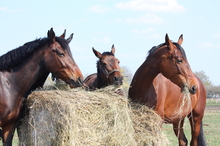Recognizing the importance of proper nutrition plays a key role in equine health and welfare, and is an essential tool when it comes to maintenance, reproduction and performance of the horse. Equine Guelph, University of Guelph, will be offering Advanced Equine Health through Nutrition, a 12-week online course, which has been designed to increase nutritional awareness by incorporating the advances in research and evolving horse management practices.

Key role of nutrition in equine health
Specific health issues will be covered including laminitis, insulin resistance and Equine Metabolic Disease, plus nutritional solutions for rhabdomyolysis, gastrointestinal diseases such as gastric and colonic ulcers, hindgut acidosis and colic.
“This course in particular takes the basic nutritional recommendations and teaches students how to apply them, particularly when feeds may be causing problems in the horse,” says course instructor Dr. Kathleen Crandell, an Equine Nutritionist for Kentucky Equine Research in Versailles, Kentucky. “Anyone who owns or feeds a horse would benefit from a good understanding of what is the best way to feed and why you should feed it.”
Crandell, who has a master’s degree in equine nutrition and exercise physiology and a PhD in equine nutrition and reproduction from Virginia Tech in Middleburg, Virginia, has been working in the horse nutrition industry as a consultant for over 15 years. She feels proper nutrition can make a difference between a healthy, content horse and “one that is just getting by.”
“While balanced nutrition is a focus of this course, we take it to the next level by exploring how nutrition can be applied to improve or maintain the health of the horse,” says Crandell. “Specific health issues that will be covered include laminitis, insulin resistance and Equine Metabolic Disease, nutritional solutions for genetically linked rhabdomyolysis which results in the rapid destruction of skeletal muscle, gastrointestinal diseases such as gastric and colonic ulcers, hindgut acidosis and colic, and nutritional therapy for orthopedic bone disease in growing horses.”
Offered online starting January 2013 through the University of Guelph as part of its Equine Welfare Certificate, Advanced Equine Health through Nutrition will be of benefit to not only horse owners or caretakers, but vet technicians and veterinarians as well, as this nutrition course will explore new findings as they relate to functional foods for health by examining current research and evidence-based practice.
